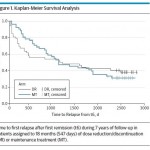The renewed debate surrounding the risk/benefit ratio of using antipsychotic medications for new onset psychotic illness has challenged the traditional recommendation of continued medication treatment for at least one year after remission. While previous studies have documented an increased rates of relapse among those whose medications are discontinued, this risk is weighed against the potential adverse effects of these medications and continued questions about long-term efficacy. Into this discussion are now some much needed data that examine the longitudinal outcomes of a group of patients who medications were reduced or discontinued versus those who received maintenance treatment.
medications and continued questions about long-term efficacy. Into this discussion are now some much needed data that examine the longitudinal outcomes of a group of patients who medications were reduced or discontinued versus those who received maintenance treatment.
In the original trial, a group of 257 subjects with first episode psychosis who had remitted and stayed well for 6 months were randomized into a group that received maintenance treatment and a group that underwent dose reduction or discontinuation. These groupings were maintained for 18 months, with analyses showing little added benefit for the dose reduction group. For this follow-up study, 103 patients from the original sample were followed for a total of 7 years during which time medications could be modified at the judgment of the clinical team. The primary outcome variable for the study was recovery which was defined as symptomatic and functional remission.
Patients in the dose reduction/discontinuation group showed a rate of recovery of 40.4% which was significantly above the 18.7% rate in the maintenance group. Rates of functional remission, but not symptomatic remission, were also significantly higher at 7 year follow-up for the dose reduction/discontinuation group. The mean dose during the final two years of the follow-up period of those in the dose reduction/discontinuation group remained significantly lower than the maintenance group (3.60 versus 2.27 mg/day of haloperidol equivalent), despite that fact that subjects in both groups were able to be treated as clinically indicated. A total of 11 patients were not using any antipsychotic medication in the last two years of follow-up.
The authors concluded that dose reduction/discontinuation provides superior long term recovery rates in comparison to conventional maintenance treatment.
This study shows some striking advantages of dose reduction/discontinuation that were not evident in the original study after 18 months of randomization. It suggests that while achieving dose reduction or discontinuation can be difficult, there may be some long term benefits. The authors state that additional data confirming these findings are needed before such a strategy is put into general clinical use. It is also worth noting that medications continued to be used for most patients in the dose reduction/continuation group, albeit as lower doses.


Thank you David for this excellent post. I am gratified to see that a child psychiatrist understands that this study has implications that go beyond the world of adult schizophrenia.
For any who may be interested, I have written about this site in my own blog:
http://www.madinamerica.com/2013/09/taking-anti-psychotics-psychotic/
and
http://www.madinamerica.com/2013/07/a-paradox-revealed-again/
Sandy Steingard